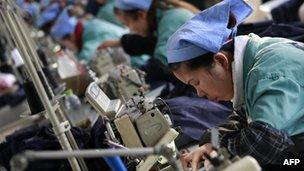China manufacturing at slowest pace in eight months
- Published
BBC's John Sudworth explores China's challenge to stabilise economic slowdown
Manufacturing activity in China registered its slowest increase in eight months in July, renewing fears of a slowdown in the economy.
The Purchasing Managers' Index (PMI) dropped to 50.1 from 50.2 in June, official data showed.
A reading above 50 indicates an expansion in activity, while below 50 means a contraction.
Economists had expected the Chinese economy to pick up in the second half of this year.
Factory output was still expanding, but new orders, including export orders, had contracted in July more than in June, according to data from the state-affiliated China Federation of Logistics and Purchasing.
'Downward pressure'
The official PMI was the lowest reading since November and is the latest sign that the growth of the Chinese economy is slowing.
The annual pace of economic growth fell to a three-year low of 7.6% in the April-to-June quarter.
Chinese leaders have said the risks to the economy are great, citing slow demand from Europe as one of the main factors.

A decline in new orders at China's factories confirms exports being hit by slowdown in Europe and the US
"Economic downward pressure is still relatively large," said Premier Wen Jiabao on Tuesday, according to the official Xinhua News Agency.
He was also quoted by Xinhua as warning that the global slowdown that is hitting Chinese exporters "could last a very long time".
Stimulus measures
A separate PMI measure carried out by HSBC was also released on Wednesday. It showed PMI rose to 49.3 in July from 48.2 in June.
While the figure is below 50, indicating a contraction, it is the biggest month-on-month jump in almost two years, HSBC said.
However, analysts still expect Chinese authorities to continue taking steps to try to boost economic growth.
"This is far from inspiring, as China's growth slowdown has not been reversed meaningfully and downside pressures persist with external markets continuing to deteriorate," said Qu Hongbin from HSBC.
"We still expect Beijing to step up policy easing in the coming months to support growth and employment," he said.
China has already cut the cost of borrowing, and promised to increase spending on airport and other projects to stimulate the economy.
- Published13 July 2012
- Published13 July 2012